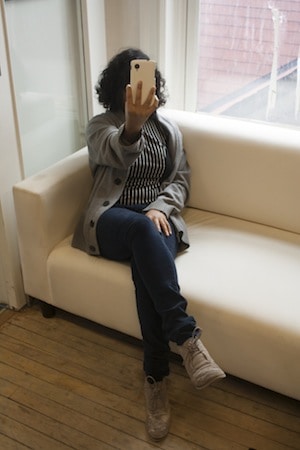Last week, photos of makeup-less women flooded social media, with the hashtag “#nomakeupselfie,” as part of a campaign to promote cancer awareness and to raise donations for cancer research. While it may have started out as a social media trend, the #nomakeupselfie movement has grown into an international campaign, prompting Cancer Research UK to encourage participants to text message their selfies to the group to donate £3 to cancer research efforts.

Selfies raise funds for cancer research. CAROLYN LEVETT/THE VARSITY
As of March 26, the campaign had raised £8 million, according to Cancer Research UK. However, the campaign has received mixed reviews — some praise its message and creativity, while others maintain that it’s ultimately an exercise in vanity, and that it lacks any real connection to the disease or to cancer research. These criticisms are not unprecedented, as similar cynicism is directed towards other alternative cancer research fundraisers.
The successes of Movember, Light the Night, and numerous walks and runs for cancer demonstrate that the form a campaign takes does not have to directly relate to the cause in order to be successful — more often than not, it simply has to bring people together through some common experience in support of a shared cause. The millions raised through the #nomakeupselfie campaign will, hopefully, make a difference in the fight against cancer.
In this case, however, there is a potential connection between the method employed by the campaign and the cause it is trying to support. For many women, wearing makeup is an automatic part of their day. However, for individuals undergoing cancer treatment, the health concerns posed by cosmetic use transform this daily routine into something far more complex.
In Canada, 187,600 new cases of cancer were diagnosed in 2013 — women made up approximately 91,400 of those cases. Many women experience a radical change in physical appearance during treatment. Chemotherapy and radiation treatments may cause women to lose their hair, eyebrows, and eyelashes. Treatments may alter skin tone, and make skin dry and sensitive. These physical changes, among others, can make wearing makeup challenging. Many products will irritate sensitive skin, and all pose a risk for infection from bacteria. These are significant concerns for individuals with compromised immune systems. Additionally, some products can actually interfere with cancer treatments, including seemingly innocuous products, such as moisturizer. For these reasons, many cancer patients cannot wear makeup.
These changes may be physical, but they are also deeply emotional. This is where organizations like Look Good Feel Better come into play. They offer services ranging from makeup application and cosmetic hygiene to wig-and scarf-styling. Their goal is to provide women with the tools to adapt to the side effects of treatment and to regain self-confidence. As the Canadian Cancer Society aptly puts it, “These changes, even if only you can see them, can affect self-esteem.” This makes individuals feel disconnected from their pre-cancer selves. Rediscovering a sense of beauty, and a feeling of empowerment, can help patients start to regain their sense of self.
The selfie campaign does not clearly articulate this information, nor does it directly explain the relationship between selfies and cancer awareness. Maybe the photos are meant to express that beauty comes in all forms; maybe by taking off their makeup, by momentarily washing away an aspect of their own sense of self, these women are showing their solidarity for others who are experiencing so much more. Or, maybe it doesn’t matter — whether it’s running, walking, taking pictures, or growing facial hair, if the funds raised by these campaigns help make 187,600 annual diagnoses a part of the past, then there’s a lot to be said for the madness in the method.
Samantha Relich is The Varsity‘s Associate Comment Editor. With files from Look Good Feel Better, Cancer Research UK, & the Canadian Cancer Society.

